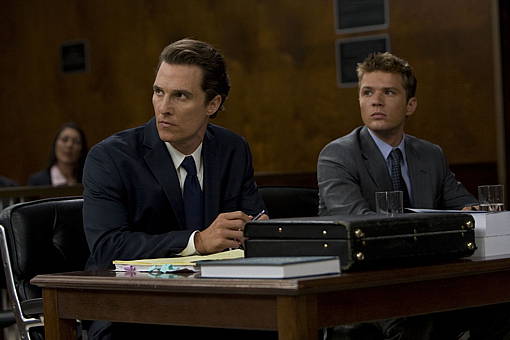By Andrew Watson · March 21, 2011

No one goes into a film believing it’s going to be real. We know that it isn’t; we know that the movie is fantastical and (often) has no basis in real life. But should a character do something stupid or nonsensical, it bugs us. I remember watching The Adjustment Bureau where David Norris (Matt Damon) meets Elise Sellas (Emily Blunt) for the third time, and I sat there thinking, “Why the hell hasn’t he got her number again?” This threw me off track for about five minutes. When a film stops you from paying attention, even if for only a minute, you think less of it. And The Lincoln Lawyer stirred similar feelings in me from the get go.
At the heart of the story is an interesting premise. Mick Haller (Matthew McConaughey)is a lawyer who can only be described as sleazy, pulling every trick in the book to get his clients off the hook, including using the location of a drug lord as a bribe for allowing a coke addled prostitute out a free woman. He’s a character lacking moral fibre. He also does all his business in a Lincoln town car, which serves as nothing more than a gimmick to show how “street” he is. In retrospect, I am pleased I was saved the sight of a car chase in which Matthew debriefs a vital witness while being pursued by gangsters. Maybe I should lay off it.
He then meets Louis Roulet (Ryan Phillipe), a rich kid pleading innocence to the charge of beating a woman with intent to rape and murder. In his investigation and questioning, Haller realizes he has taken on a duff case: someone has withheld evidence, the defendant lying about a knife in his possession, and sooner than later, the tables are turned as he comes to the realization that his own defendant is the same man who set up one of Haller’s former – and actually innocent – clients, who is currently locked away in San Quinten State Prison. A crooked lawyer who plays dirty to get his clients off the hook takes on a case that he can’t win? It’s a decent premise, a little clichéd, but still exciting enough to drive a good story out of it.
Unfortunately, its execution is sloppy. A film lives or dies by its ability to make us suspend our disbelief; its ability to make us feel the actions or events that unfold must feel credible. The first instance I struggled with occurred with Maggie (Marisa Tomei), Mick’s ex-wife and “so-called” love interest. It’s never entirely convincing that these two ever had a meaningful relationship; she’s a by the book prosecution lawyer, who seems to hate his methods. They sleep together early on and are left in an awkward position, trying to avoid their daughter from catching him at the house, which causes Maggie to flip out. Believable? No. Completely forced. Yes.
And forcing it continues with some on-the-nose and clichéd dialogue. Mick meets a detective half way through that serves to simply tell him how much of a scumbag he is and to mock him when there is a sad twist later on. One witness comes off as a cartoon caricature as he speaks entirely in courtroom humour, and there are moments when the law talk feels ‘preachy’. It made me more aware that this was an adaptation of a best seller, and I wouldn’t be surprised if there were lines lifted straight from the book.
The film manages to pick up later, however, and sets up an interesting, yet hokey, conflict as the Roulet closes in on and turns the tables on Haller yet again, but it’s still a bit hard to follow the who’s and the what’s and the how’s, and the film falls off a cliff as the trial begins: clichéd witnesses, followed by dirty tactics, and more dirty tactics that seem to go on, and on, and on… forever. And when the trial ends, the movie continues, happily throwing more shocks and more twists, and twists upon twists, the final one being beyond ridiculous. I actually laughed out loud – for all the wrong reasons.
Another problem is the journey itself. As a character, Mick makes no real change whatsoever throughout his journey, apart from some talk about making things right (while drunk, of course). This is left unanswered by the final scene, in which he gives his crooked biker clients a freebie (only to manufacture loyalty as “repeat customers” so he can jack up the price on their next case). In the end, he drives off in his Lincoln, acting no different than day one. This is not necessarily a bad thing, Mark Zuckerberg spends the entirety of The Social Network the same ‘asshole’ from start to finish, but what separates these two characters is how Zuckerberg feels at the end. There has been a change and growth. For Mick Haller, not so much. He’s still the same guy. Exactly!
The main character must make some kind of change, or be forced to face failure or success of his goal at the cost of what he really needs in life. Returning to Zuckerberg, he wants success and a better, less lonely, and more popular life. What he really needs is self-esteem and genuine friendship, which he throws away with reckless abandon. This lesson is sadly missing from the Lincoln Lawyer.
It doesn’t help that it’s filmed in the Tony Scott School for Inappropriate Cinematography, which tends to suck all the tension out of the reconstructions by making it look like CSI, and not a genuine film. The film actually feels like a TV movie, which would have been fine if I hadn’t paid £15.00 to see it. Ultimately, The Lincoln Lawyer is guilty of another unremarkable chapter in the courtroom drama.